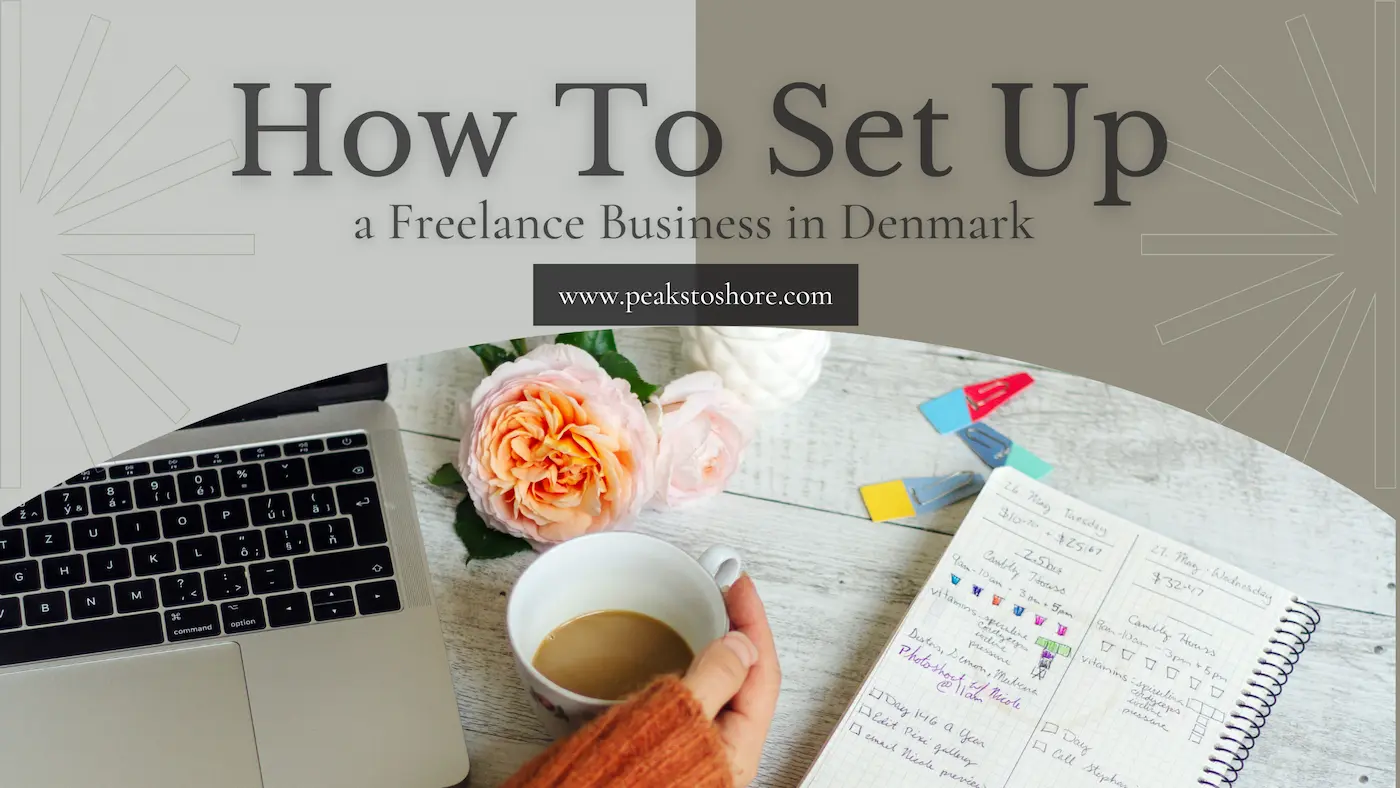Thinking about going freelance in Denmark? Whether you’re drawn by the work-life balance, the digital infrastructure, or the Nordic lifestyle, Denmark is becoming an increasingly attractive hub for freelancers and digital nomads. But setting up a freelance business as an expat isn’t as simple as opening a laptop. There are legal hoops, cultural nuances, and logistical steps to understand before you’re officially your own boss.
In this guide, I’ll walk you through how to start a freelance business in Denmark as an expat — from understanding legal status and registering with authorities to invoicing, taxes, and finding clients. This is designed to give you a realistic roadmap, along with practical tips and links to trusted sources.
1. Can Expats Legally Freelance in Denmark?
Before diving into the how, it’s important to understand if you’re eligible to work as a freelancer in Denmark.
📌 Residency & Work Permits
If you’re an EU/EEA citizen, you’re free to live and work in Denmark without a work permit. However, you still need to register with the Danish authorities and obtain a CPR number (personal registration number).
If you’re a non-EU/EEA citizen, you’ll need a residence and work permit, often under schemes like the Startup Denmark program or Pay Limit Scheme. These permits usually require a business plan or minimum income.
📖 Read more about Danish work permits on New to Denmark
2. CPR Number and NemID (MitID): Your First Essential Steps
To operate legally in Denmark, you’ll need a CPR number — essentially your social security number. With it, you’ll also get access to:
- NemID/MitID: Your digital ID used for tax filing, banking, and government services.
- Digital Post: Your secure government mailbox.
- Sundhedskort (yellow health card): For accessing public healthcare.
Once you have a CPR number, apply for NemID/MitID at your local Borgerservice (citizen service center).
💡 Internal Link: Check our guide to Moving to Denmark: What They Don’t Tell You for a deeper look into setting up life admin.
3. Choosing the Right Legal Structure
In Denmark, freelancers typically operate as a sole proprietorship (Enkeltmandsvirksomhed). This structure is:
- Easy to register
- Suitable for solo freelancers and digital service providers
- Taxed via your personal income (no corporate tax)
Other options include:
- IVS or ApS (limited companies): Suitable if you have higher earnings or want to limit liability.
- Freelancing via an umbrella company (Lønmodtagerstatus): Popular for short-term expats or non-residents.
📎 More info on business structures at Virk.dk
4. Registering Your Freelance Business
Here’s how to officially register:
✅ Steps to Register:
- Visit virk.dk and go to the “Start a Sole Proprietorship” section.
- Log in using your NemID/MitID.
- Choose a business name and activity code (SKAT uses these for tax classification).
- Register for CVR number (Central Business Register).
Once approved, you’ll receive your CVR and can legally operate as a business in Denmark.
⏳ Processing time: 1–2 days typically.
5. Understanding Danish Taxes as a Freelancer
Freelancers in Denmark are subject to personal income tax. Here’s what to keep in mind:
💼 Types of Taxes:
- Income Tax: Paid progressively based on income. Expect high rates — up to 55% depending on your income bracket.
- VAT (Moms): If your annual turnover exceeds DKK 50,000, you must register for VAT (25%).
📌 Tax Tools You’ll Use:
- SKAT.dk: The Danish tax portal where you file returns and manage VAT.
- E-Indkomst: Used to report your earnings.
- TastSelv: Your login system to access personal and business tax info.
💡 Tip: Track all income and expenses with a bookkeeping tool. Dinero and Billy are great tools for small businesses and offer English interfaces.
6. Invoicing and Accounting Essentials
Invoicing must follow Danish regulations. An invoice should include:
- Your CVR number
- Your name and business address
- Client’s info
- Description of service
- VAT details (if applicable)
- Invoice number and issue date
You must also store invoices for at least 5 years for audit purposes.
📌 Outbound Resource: Danish Business Authority’s Guide to Invoicing
7. Opening a Business Bank Account in Denmark
If you’re serious about freelancing, separating personal and business expenses is key.
- Local banks like Danske Bank and Nordea offer business accounts but require a CPR and CVR number.
- Online options like Lunar or Revolut Business can be a faster setup, especially for digital nomads.
💡 Tip: Some freelancers keep an international account (like Wise) for receiving payments in multiple currencies without high conversion fees.
8. Insurance, Pension, and Healthcare
As a freelancer, you’re responsible for your own safety net.
💡 Consider:
- Liability Insurance: Covers client disputes or accidental damages.
- Health Insurance: Denmark offers public healthcare with a CPR number, but private add-ons are available.
- Pension: Optional, but many freelancers contribute to private pension schemes.
📖 Read more about Denmark’s healthcare system
9. Finding Clients and Growing Your Network
Denmark’s freelance ecosystem is growing — especially in tech, design, writing, and consulting. Start here:
🚀 How to Get Started:
- Local platforms: Worksome, Amino.dk
- Global platforms: Upwork, Fiverr, Freelancer
- LinkedIn: Very active professional scene in Denmark
- Co-working spaces: Try Republikken (Copenhagen), DARE2Mansion, or Matrikel1
- Events: Join Meetup.com for networking nights or expat communities.
📌 Internal Link: Read Remote Work in Europe: Best Cities with Coworking Spaces for top digital nomad hubs in Denmark.
10. Pro Tips from Freelancers Living in Denmark
🟢 Expect bureaucracy — but it’s manageable once you have your CPR and NemID.
🟢 Track expenses from day one — Denmark allows tax deductions for business tools, transport, and even home office setups.
🟢 Use English, but learn Danish — clients will appreciate effort. Language isn’t mandatory, but it builds trust.
🟢 Watch for VAT traps — charging or not charging VAT can make or break a client relationship.
FAQs: Freelancing in Denmark for Expats
Q: Can I freelance part-time in Denmark while employed?
Yes, but you must declare all income and ensure no conflict with your contract.
Q: Do I need to speak Danish to freelance?
Not necessarily. Most clients and public systems support English, especially in Copenhagen and Aarhus.
Q: What if I move away from Denmark?
You can keep your Danish freelance business if you maintain a tax residency or register as a non-resident entity (but be mindful of double taxation).
Q: Can I get financial aid or unemployment benefits?
Freelancers don’t automatically qualify. You must contribute to a private unemployment fund (A-kasse) for eligibility.
Q: How much does it cost to register a business?
Sole proprietorships are free to register. Limited liability companies have minimum capital requirements.
Final Thoughts: Is Freelancing in Denmark Right for You?
Setting up a freelance business in Denmark as an expat may seem daunting — but it’s completely doable with the right preparation. Denmark offers a stable, digital-friendly, and socially secure environment for self-employment. The bureaucracy is fair (if slow), and the support system is transparent once you’re set up.
Whether you’re a designer relocating to Aarhus, a writer in Odense, or a digital strategist based in Copenhagen, freelancing in Denmark offers flexibility and long-term potential.
✅ Next Steps:
- Get your CPR and NemID/MitID
- Register your business on virk.dk
- Set up a business bank account
- Explore local co-working spaces and networks
- Stay on top of taxes and compliance
- Bookmark peakstoshore.com for more expat and freelance insights
💬 Let’s Talk!
Are you planning to freelance in Denmark or already running a solo business here?
Have any challenges or success stories to share?
Drop your comments below — I’d love to hear from you!
And don’t forget to subscribe for more real-life guides on freelancing and living abroad.






0 Comments